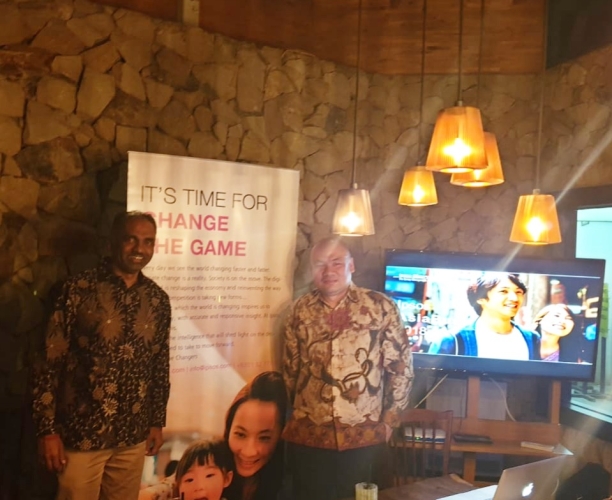

Ipsos Ceo SEA "Building & Grooming Local Talent is Our Priorities To Grow Business in Indonesia"
Jakarta, 18 September 2018 - Ipsos has recently appointed Suresh Ramalingam as the CEO for South East Asia (covering Singapore, Malaysia, Thailand, Vietnam, the Philippines, and Indonesia).Suresh is based in Kuala Lumpur, and reporting to Christophe Cambournac, who is the CEO of AMEA (Asia, Middle East and Africa).
For three days, starting yesterday -- Suresh has been conducting a visit to Ipsos’ Jakarta office, to learn more about how the team in Indonesia is gearing up to pro-actively cater to the needs of the market in this exciting business climate.
Commenting on this new role, Ramalingam said: "I am very excited to lead the fast growing South East Asia region at Ipsos to provide clients with the best solutions and actionable insights that will help them address their business priorities. In addition, building & grooming local talents is one of the priorities in the SEA region which will be personally led by me”
Bringing-in in more than two decades of extensive experiences during his tenure in previous global organization, Suresh is very keen to drive the MR transformation that is the need of the hour in the markets to help clients with the most updated solutions to cater to their business needs.
“I will take a look at how I could contribute more in shaping Ipsos’ leadership in Indonesia to support the market & business needs, especially in this very important phase for Indonesia, whereby not only a presidential election and general election for the legislatives will take place next year but the Indonesian market is going through a great positive transformation” Suresh explained.
Indonesia is of great importance for Ipsos, considering there are many big brands both nationals and multinationals making Indonesia their home thanks to its potential market opportunities.
“Laser sharp client focused and innovative solutions will be a key priority for Ipsos to make its mark and grow more in this market,” he added.
At this moment, in its ten years of operation, Ipsos in Indonesia contributes 20% of Ipsos business in the South East Asia region and is now enjoying the 3rd position in the big five market research agencies operating in Indonesia.
Speaking about the next target, Ipsos envisions to be able winning bigger share in the market while obtaining more opportunities to be partnering with Clients that would also enhance Ipsos’ profile and portfolio.
“We do hope that with Suresh on board, my team in Indonesia will also have a lot of opportunities to learn and grow under Suresh’s mentorship and guidance,” said Soeprapto Tan, Managing Director for Ipsos in Indonesia.
“Globally, Ipsos has been known for its knowledge and insights that cater various aspects every brands need to learn about their audience, so that they are able to continue delivering innovative products or solutions,” added Soeprapto. “That is something that we want to achieve too in Indonesia, where Ipsos can be regarded as the knowledge center for every parties or individuals who needs insights and understandings on various aspect that will make their decision makings are rich on research-based facts.”
In anticipating the 2019 Presidential Election, Ipsos recently just conducted an AsiaBUS, a regular quarterly omnibus survey, where three initial questions were included, in order for Ipsos to understand how the Indonesian millennials’ readiness to participating. This survey was conducted after the Presidential Election Candidacy declared. Involving 1,000 respondents from five big cities in Jakarta, Surabaya, Bandung, Medan and Makassar.
According to the results of the survey, it is found that 96% of the respondents are going to vote in next year’s Presidential Election. Interestingly, the 5% of first-voters are still not decided whether they are going to vote. If we take a closer look at the findings; 92% of first-voters claiming that they would vote. Meanwhile 96% of millennials claiming that they are going to vote, and only 2% who said they would not vote. On the other hand, 97% of older voters claimed that they will vote, and only 3% said they would not.
When asked about how they already decided which candidate they would vote for, 74% of the respondents already decided who to vote, which means there are 26% of the respondents which are still potential to be swing voters. And if we dig down by the respondents group; 73% of millennials claim they already decided, and 27% have not decided yet. And 67% of first-voters said they has decided which candidate they would vote for, and 33% did not made the decision yet. Meanwhile, 77% of older voters have decided on their candidate, while 33% still not decided.
More than half of the voters are looking for a candidate who is able to provide solutions to current problems as main consideration in choosing the candidate. First voters are tend to be idealist by choosing candidate who has clean record, meanwhile the millennials prefer to have an assertive president. In addition, older voters will choose not only assertive but also religious as well.
“This is very encouraging to see how the young Indonesians are already understand about their rights for voting and use their rights to vote,” said Suresh. “I am sure, there are more interesting and enriching insights about Indonesian millennials which we can learn and share with our clients. But this is already a good start, to learn that they are taking part in this very important event of the country, next year.”
Other events
-
02
Nov 2023[Webinar] One Mind Many Truths: An Ipsos APAC Webinar on Generations
- 13:00 JKT
- Online webinar
![[Webinar] One Mind Many Truths: An Ipsos APAC Webinar on Generations](/sites/default/files/styles/200x112/public/ct/event/2023-10/MicrosoftTeams-image%20%2810%29_0.png?itok=vIUj5nxL)
-
17
Nov 2022
-
15
Jan 2020IPSOS MARKETING SUMMIT 2020 : " INDONESIA THE NEXT CASHLESS SOCIETY"
- 09.00
- Pullman Hotel - Central Park , Jakarta Letjen S. Parman St No.Kav. 28, RT.12/RW.6, South Tanjung Duren, Grogol petamburan, West Jakarta City, 11470


